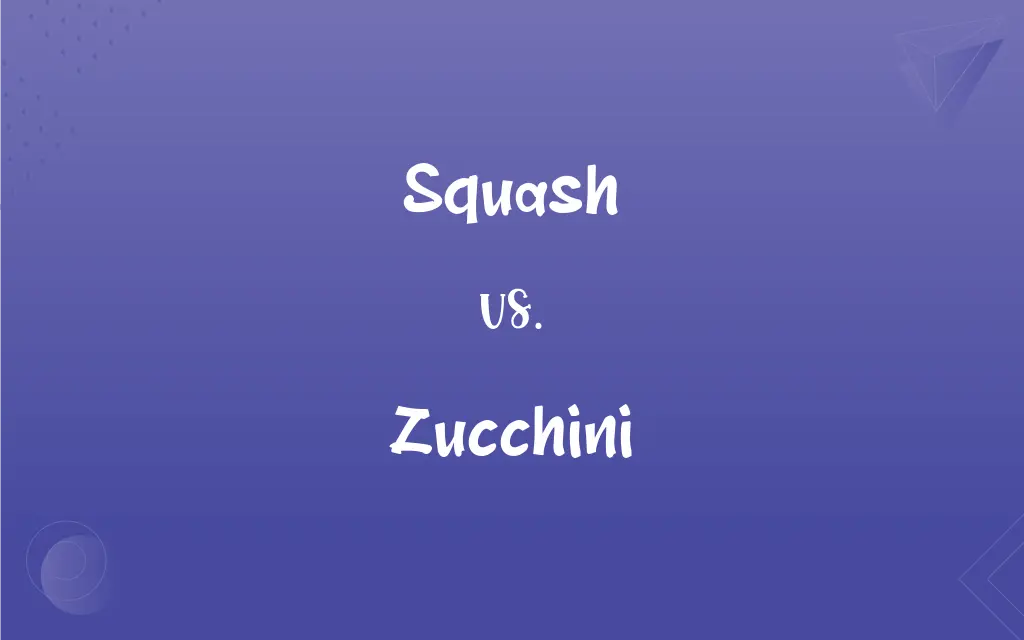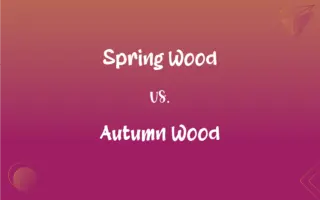Squash vs. Zucchini: What's the Difference?
Edited by Aimie Carlson || By Harlon Moss || Updated on July 4, 2024
Squash refers to various gourds, while zucchini is a specific type of summer squash with green skin.

Key Differences
Squash encompasses a wide variety of gourds from the Cucurbitaceae family. This diverse group includes different shapes, sizes, and flavors that can be categorized into summer and winter squashes. Zucchini, on the other hand, is a specific type of summer squash known for its mild flavor and slender shape with smooth, green skin, though there are also yellow varieties.
Both squash and zucchini are fruits botanically, but they are usually treated as vegetables in culinary contexts. While squash can have a range of flavors, textures, and appearances, zucchini typically presents a uniformly light, almost watery flavor, making it versatile in various dishes. Moreover, many squashes might possess hard rinds or unique tastes that require specific preparation methods. In contrast, zucchini can often be consumed raw or cooked without much alteration.
In terms of nutrition, both squash and zucchini offer valuable vitamins and minerals. Squashes, depending on the type, can be richer in certain nutrients like beta-carotene, especially in varieties like butternut or acorn. Zucchini, being a type of squash, also offers nutritional benefits, particularly in vitamin C and potassium.
It's essential to recognize that zucchini is a subset within the broader squash category. This means that while all zucchinis are squashes, not all squashes are zucchinis. Culinary applications, growing seasons, and physical characteristics might overlap to some extent, but the distinct identity of zucchini sets it apart from the extensive world of squash.
Comparison Chart
Type
Genus of plants encompassing various gourds
A specific kind of summer squash
ADVERTISEMENT
Texture
Varies; can be firm or soft based on type
Typically soft with a watery interior
Color Varieties
Varies widely, from green to orange to yellow
Primarily green, but also available in yellow
Flavor
Ranges based on variety
Mild and light flavor
Culinary Use
Based on type; can be roasted, mashed, etc
Versatile; eaten raw, sautéed, grilled, etc
Squash and Zucchini Definitions
Squash
A vegetable from the gourd family with various shapes and flavors.
She added chunks of squash to the stew.
ADVERTISEMENT
Zucchini
The fruit of the species Cucurbita pepo, treated as a vegetable.
She added fresh zucchini to the salad.
Squash
A term covering both summer and winter vegetable varieties.
Her favorite type of squash is butternut.
Zucchini
A common ingredient in Mediterranean cuisine.
Zucchini fritters are a delicious appetizer.
Squash
Edible gourds, typically with thick flesh and seeds inside.
Acorn squash tastes great when roasted.
Zucchini
A slender summer squash with green or yellow skin.
He grilled slices of zucchini for dinner.
Squash
The fruit of plants from the genus Cucurbita.
He planted different types of squash in his garden.
Zucchini
A mild-flavored, elongated vegetable often used in sautés.
Zucchini noodles are a healthy pasta alternative.
Squash
A versatile vegetable used in various cuisines and dishes.
She made a creamy soup using squash.
Zucchini
A soft-textured squash that can be eaten raw or cooked.
She made zucchini bread for breakfast.
Squash
Any of various bushy or vining plants of the genus Cucurbita, having unisexual flowers and fleshy edible fruit with a thick rind when mature.
Zucchini
A variety of summer squash (Cucurbita pepo) having an elongated shape and a smooth, thin, dark green rind.
Squash
The fruit of any of these plants, eaten as a vegetable.
Zucchini
A courgette; a variety of squash, Cucurbita pepo, which bears edible fruit.
Zucchini
The edible fruit of this variety of squash.
Zucchini
Marrow squash plant whose fruit are eaten when small
Zucchini
Small cucumber-shaped vegetable marrow; typically dark green
FAQs
Is zucchini considered a summer or winter squash?
Zucchini is a summer squash.
How do you know when squash or zucchini is ripe?
Both should feel firm, with smooth skin free of blemishes.
Is spaghetti squash related to zucchini?
Both belong to the squash family but have different textures and uses.
Can zucchini be used in place of other squashes in recipes?
Often, yes, but flavor and texture may vary.
Which is more nutritious, squash or zucchini?
Both offer nutritional benefits, but specific nutrients vary based on type.
What's the primary flavor difference between squash and zucchini?
While squash flavors vary, zucchini has a consistently mild flavor.
What's the difference in texture between squash and zucchini?
While squash textures vary, zucchini is generally soft and moist.
Are zucchini and squash the same?
Zucchini is a type of squash, but not all squashes are zucchinis.
Which lasts longer, squash or zucchini?
It depends on the type of squash; some winter squashes last longer than zucchini.
Can you eat the skin of both squash and zucchini?
Zucchini skin is edible, while some squash skins may be too tough.
Are squash and zucchini fruits or vegetables?
Botanically, they're fruits, but they're treated as vegetables in cooking.
How do you reduce moisture in zucchini for baking?
Grate the zucchini and squeeze out excess water using a cloth.
How can you store squash and zucchini?
Both should be stored in a cool, dry place, but zucchini is best refrigerated.
Are the flowers of squash and zucchini edible?
Yes, both squash and zucchini blossoms are edible.
Can you eat the seeds of squash and zucchini?
Yes, both are typically consumed with their seeds, especially when young.
How do you grow squash and zucchini?
Both require well-draining soil, ample sunlight, and regular watering.
Are there yellow zucchinis?
Yes, alongside the common green variety, yellow zucchinis also exist.
What's a good substitute for zucchini in recipes?
Depending on the recipe, other summer squashes or cucumber might work.
Why is zucchini sometimes called courgette?
"Courgette" is the term for zucchini in British English.
What are common dishes made with zucchini?
Zucchini bread, zoodles (zucchini noodles), and grilled zucchini are popular.
About Author
Written by
Harlon MossHarlon is a seasoned quality moderator and accomplished content writer for Difference Wiki. An alumnus of the prestigious University of California, he earned his degree in Computer Science. Leveraging his academic background, Harlon brings a meticulous and informed perspective to his work, ensuring content accuracy and excellence.
Edited by
Aimie CarlsonAimie Carlson, holding a master's degree in English literature, is a fervent English language enthusiast. She lends her writing talents to Difference Wiki, a prominent website that specializes in comparisons, offering readers insightful analyses that both captivate and inform.
































































